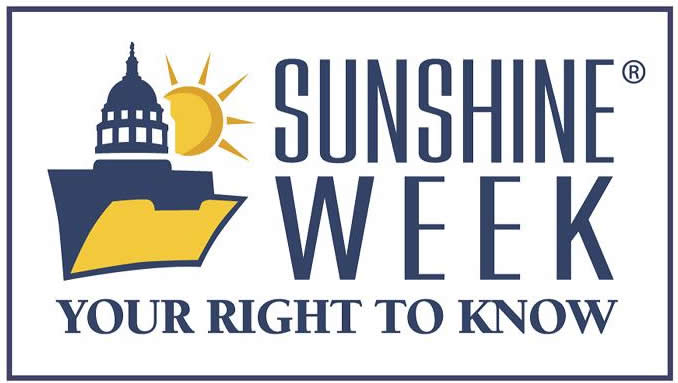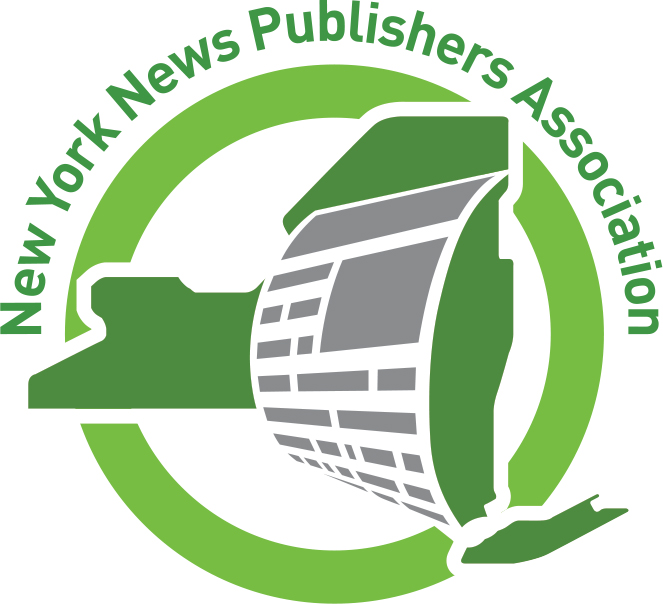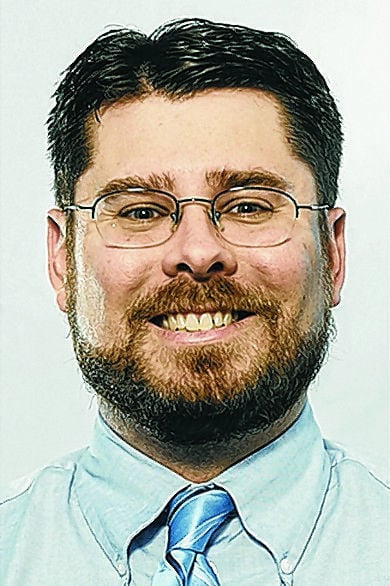|
New York News Publishers Association Home | About | News | Member Services | Advertising Services | NIE | Foundation | Contact Us |
|||
Sunshine Week 2017 - March 12-18

Sunshine Week is a national initiative to promote dialogue about the importance of open government and freedom of information. Participants include news media, civic groups, libraries, nonprofits, schools and all others interested in the public’s right to know. Sunshine Week seeks to enlighten and empower people to play an active role in their government at all levels, and to give them access to information that makes their lives better and their communities stronger.
The American Society of News Editors (ASNE) has collected and posted resources for educators and students for Sunshine Week. Visit their website at www.schooljournalism.org
Click here to access a set of graphic organizers and a list of web resources for teachers about Sunshine Week!
Below you'll find commentary and editorials about the importance of Freedom of Information. This content is available for all NYNPA member publications to reprint with attribution to increase public awareness of Sunshine Week and their right to know. Additional content will be added as it is received.
Committee on Open Government Department of State
|
Fake News and Finding the Truth“I read it on the internet” isn’t necessarily the same as “I read it on the internet so it must be true.” The real truth is that it’s becoming increasingly difficult to know what’s true and what’s not. We’re flooded with information, which makes it difficult to distinguish between what is factual as opposed to an opinion. Too often, a source that appears to be “official” or authoritative emanates from a person or organization that has a political goal or is biased in some way. We’ve been hearing a lot lately about “fake news”, and most of us have, at one time or another, believed that news was accurate, only to learn later that it was false. Many of us, and especially young people, go to “google” when we want information, but how can we be reasonably certain that the information posted online is accurate or, in some cases, either deliberately misleading, or an opinion rather than fact? One of the tools used by journalists is a law that generally requires that government records be made available to the public. There is a federal Freedom of Information Act (FOIA) that applies to federal government records, and every state has enacted its own version of an FOI law. In New York, it’s called the Freedom of Information Law (FOIL). Under the federal Act and in most states, it doesn’t matter who you are, where you live, or even why you want them - - anyone can request government records. Most FOI laws are based on a presumption that government records are available. Unless the government can justifiably rely on an exception to rights of access appearing in the law, records must be disclosed. Usually the exceptions relate to the possibility that disclosure would result in some sort of harm. For example, typical is an exception intended to protect personal privacy. If I request your social security number from a government agency, the agency has to deny access. That item can be used as a connection to a variety of other information about all of us that’s nobody’s business. If the police are investigating a crime, and disclosure would interfere with the investigation, the government can deny access. But when we’re trying to learn the truth, the government is required to disclose statistics and facts. If politician tells us that the water we drink is safe and you want to know if that’s true, you can obtain the latest tests from a local health department or water authority to find out what’s in the water. It’s also important to know whether the politician is trustworthy and deserves your support. If you’re having trouble with math and want to find out whether your teacher is certified to teach that subject, FOIL gives you the right to request and obtain the record indicating that the teacher is qualified (or not). You can and need to be informed in order to make your own judgment. Government records, more often than not, are based on the facts and are accurate. When you use FOIL to obtain records from a government agency, whether it’s your county, city, town or school district, you know the source and can feel with certainty that their content is real - - not fake. |
Editorial Page Editor
|
You Have to Fight for FactsIf you can't trust the government and you won't trust the media, where can you turn to for accurate information? |
Executive Editor
|
Sunshine Week more important than everThere's been plenty of attention in these first few weeks of the Trump administration on the First Amendment and freedom of the press. From his declaration that the news media is an American enemy to his frequent claims that news stories or news organizations are "fake," "failing" or both, President Trump has made his disdain for journalism clear. Take a look at a few polls, and you'll see there's plenty of Trump supporters who wholeheartedly agree with him. Given the bitter divisiveness that's prevalent in our country, it doesn't surprise me to see information such as a Quinnipiac University survey that found 86 percent of Democrats trust the media more than Trump, while 78 percent of Republicans felt the opposite way. As a longtime newspaper journalist, my biased answer to that question is that I'm more trustful of the news media. But I also felt the same way about the Obama administration, the Bush administration and the Clinton administration. That's because my experience covering government at all levels has been that despite the lofty ideals most politicians espouse about democracy when they're on the campaign trail, they all tend to have a natural inclination to want to control the information that is released to the public. That's why freedom the press is important, but just as crucial are the laws that ensure we all have access to the records our governments keep and the meetings they hold. Without statutes such as the New York Freedom of Information Law and the federal Freedom of Information Act, we'd be limited in our ability to preserve the public's right to know. That's a fact that's not pro- or anti-Trump, and it doesn't favor liberals or conservatives. For all of our problems in this country, we still have a robust public debate, but that cannot happen without independently reported information. For those reasons, I believe the importance of government transparency is as vital today as ever. This year's nationwide effort of Sunshine Week, March 12-18, needs to be especially effective. Sunshine Week is an effort spearheaded by the American Society of News Editors and Reporters Committee for Freedom of the Press, and it's supported by organizations such as the John S. and James L. Knight Foundation and The Gridiron Club and Foundation. |
Poughkeepsie Journal Editorial Board
|
Sunshine Week fights darkness in government"Sunshine Week" is more than a catchy title. It's a bold and noble endeavor to push for more openness from government. And that can come in several forms – through unfettered access to public meetings and to public documents. The weeklong effort is coordinated by the American Society of News Editors and the Reporters Committee for Freedom of the Press. But “Sunshine Week” goes far beyond recognizing journalists. It’s also a profound acknowledgment of the public’s right to know.
New York has two bedrock provisions on the books that rightly embolden the public in these regards: The state Open Meetings Law and Freedom of Information Law. But both laws could be made stronger – much stronger. For too long, the state has failed to attach meaningful penalties when government officials either violate the open meetings law or don't hand over documents in a timely manner. Sure, there are times when the government doesn't have to be so forthcoming with information. But those instances are supposed to be few and far between. They include when the release of information might endanger someone's life or impede legal negotiations. Despite what you might hear sometimes, public boards can't simply go into closed session to discuss "personnel issues" or "litigation"; the given reasons are supposed to be more specific than that, and they should be articulated during the public part of meetings. Absent the rightful use of the exceptions, public officials should be slapped with stiff penalties, even removal of office, for failing to act in an open manner. What’s more, courts should be given greater latitude to nullify board decisions that are reached improperly. Government agencies also are supposed to make meeting materials available prior to or at meetings and post them online when possible. This encourages thoughtful participation by the public and allows those attending meetings to more fully understand what is being discussed and perhaps ultimately voted upon. When it comes to the righteous push for a more open government, the public should keep four words in mind: “the presumption of access." That is, the public must insist the onus be placed on government to argue why documents or meetings should be closed, not on citizens to advocate why they should be open. That distinction must be drilled into the head of every public official. And there is no better time than “Sunshine Week” to repeat the message. |
Press Republican, Plattsburgh Editorial Board
|
Shining light on elected officialsThe news media are in the spotlight now more than in any time in recent memory. President Trump has dubbed reporters "enemies of the people," banned certain media outlets from White House briefings and proclaimed that unnamed sources should "not be allowed." His press bashing was a frequent campaign theme, and he hasn't let up since the election. Some Americans surely agree with Trump, seeing reporters as out of touch — few saw his victory coming, after all — or arrogant. But we think his attacks have actually stirred new support for the reporters whose jobs focus on holding all elected officials accountable — even the president. The pushback from Trump and his staff and their attempts to control the flow of news and information are backfiring, we believe, because Americans, in their hearts, know the importance of an unfettered press. Just this week, one of our editors was at Plattsburgh Public Library when she was approached by someone who wanted to stick up for the media. The woman felt frustrated over Trump's actions and suggested journalists around the world mount a social-media campaign to remind people about many examples of momentous news they would never have known about without newspaper, radio or television reporting. Journalists have, throughout history, played leading roles in rooting out corruption, disseminating information and fighting for the public's right to know what leaders are doing. Today marks the start of Sunshine Week, an effort begun in 2005 by the American Society of Newspaper Editors to remind people of the importance of open government and access to information. Sunshine Week was planned to coincide with the March 16 birthday of James Madison, father of the U.S. Constitution and a key advocate of the Bill of Rights. The Founding Fathers — among the most brilliant minds ever assembled — knew well the importance of a free and unrestricted press. The First Amendment of the U.S. Constitution clearly states: "Congress shall make no law respecting an establishment of religion, or prohibiting the free exercise thereof; or abridging the freedom of speech, or of the press; or the right of the people peaceably to assemble, and to petition the Government for a redress of grievances." Thomas Jefferson wrote from Paris to Edward Carrington, a delegate to the Continental Congress from 1786 to 1788, about the significance of a free press in keeping government in check. Jefferson concluded that if he had to choose between “a government without newspapers or newspapers without a government, I should not hesitate a moment to prefer the latter.” Journalists have a responsibility to maintain objectivity, to always pursue the truth, to focus on accuracy. Their world has become blurred, to some degree, by sea changes in communication: The internet, Facebook, Twitter and other social-media sites have split wide open the traditional views on who distributes news and how. They are adjusting to the changes, sometimes successfully, sometimes not. But the vast majority of members of the mainstream media operate with integrity and a sense of responsibility to the American people. They will not be thwarted in their mission — even by the president of the United States. |
|
Times Union, Albany
|
Shine light on LegislatureForty-three years ago, New York's state Legislature took a huge step from the days when government officials could arbitrarily keep secrets and do public business behind closed doors, to an era of greater transparency and accountability. One entity in particular, though, was left largely beyond the reach of the new Freedom of Information Law: the Legislature itself. As the nation begins Sunshine Week — an annual opportunity to both celebrate open government and try to build on it — that glaring exemption stands out in New York. It's all the more conspicuous in a body that still seems to regard public scrutiny more as an annoyance than an obligation. Consider the rules of the state Senate, which bar using cellphones to take still photographs, video, or sound recordings on its premises without permission. That includes not just the Senate chamber, but the lobby and galleries. The only people expressly allowed to use this widespread technology are official Senate photographers and videographers — that is, those whose job it is to document only what the Senate's leadership wants documented. Imagine that: having to ask your elected representatives for permission to record them while they conduct public business, on your tax dollars' time, in a chamber in a building maintained by your taxes. The chutzpah is stunning. Yet, apart from some individual lawmakers with an enlightened sense of civic duty, this has essentially been the legislative mindset for decades. Since the passage of the state's first Freedom of Information Law in 1974, and a significant revision in 1977, the Legislature has occasionally strengthened it, but lawmakers tend to view transparency as something for local governments and other state agencies and branches of government, but not for themselves. That needs to change. It could start with a simple gesture: Scrap that offensive Senate rule on cellphone use and replace it with something reflecting government openness. It's entirely possible — ask any local government official — to craft a policy that maintains decorum while allowing the public to document the doing of the public's business. A far more sweeping and meaningful change would be for the Assembly and Senate to include themselves in the definition of "agency" in the Public Officers' Law, making them subject to FOIL like just about every other government office or body. We are not the first to suggest this: The state's own Committee on Open Government has called for it, too. The law could be written to address one key concern of lawmakers — the need for some confidentiality in communications with constituents. As the committee noted, communications of a personal nature could be withheld on the grounds of personal privacy — though the line should be drawn at corporate and businesses interests. There is, as the committee noted, nothing personal about that. And as we've seen in corruption cases in recent years, it's not particularly in the public's best interest to keep such matters secret. |
|
Managing Editor, (This editorial may be edited/localized for use by other NYNPA member newspapers)
|
Partly Cloudy on Sunshine WeekIt’s Sunshine Week for newspapers and broadcasters across the United States. That doesn’t mean the media are celebrating happy news. The week’s purpose is to draw the public’s attention to the threats to and triumphs of open government laws. In New York for the past 40 years or so, a section of Public Officers Law has codified two important civic protections: the right of people to watch their government in action and the right of the public to freely examine and copy government documents. The two sections of the law, referred to as the Freedom of Information and the Open Meetings laws, were enacted to ensure that people have access to the workings of their many layers of government. Succinctly stated, the Open Meetings Law prevents public bodies, whose members are both elected and appointed, from doing public business in private. The Freedom of Information Law prevents the government from hiding documents that are central to the government’s actions and are thus deemed to be public. There are many citizen activists who understand and utilize these laws. Bruce Krug of Constableville, for example, helps keep Lewis County officials honest by compelling open access to documents. And numerous public interest groups use the laws to gain access to documents important to their research and causes. However, these laws primarily have become well-used tools of the media in our continuing efforts to fight shady deals made behind closed doors. Forty years on, our experience is that without these laws, New York state would be a far worse morass of ethical violations and corrupt government than it is today. Johnson Newspapers has six daily and a number of weekly publications that range from the Hudson Valley to the north country to the Western Tier. All of our papers drum into our reporters the importance of open government and the processes they must understand to ensure the law is being followed. At our Hudson and Catskill daily papers, for example, there are 35 outstanding or just completed Freedom of Information Law actions. Editor Mary Dempsey says the paper files 80 FOIL requests per year. Reporter Marcus Wolf has used the law to obtain documents from the village of Clayton that have allowed us to fully cover the continuing controversy swirling around its historic district street repair project. In St. Lawrence County, the law has provided us with documents that have allowed us to provide important information about the inner workings of the Ogdensburg Bridge and Port Authority. Despite the law, public officials continue sometimes Herculean efforts to hide information from the public. In Hudson, the company has been forced to take the New York State Police to court to gain access to commonly open police blotter reports surrounding the tragic death of a baby in a Dumpster. In Batavia, when a local judge (a retired state trooper) closed a murder arraignment to the public because the defendant was the daughter of a high-ranking state police zone commander, the paper sought an emergency injunction to open the arraignment to the public. The injunction was not delivered in time, but the persistence of the paper in opening this case to public view has resulted in the departure of the local judge and a full airing of the charges against the defendant. Sunshine Week celebrates these kinds of successes. But more importantly, it draws attention to the fact that without them, public officials will try to return to the bad old days of government in secret. Bob Freeman heads the state’s Committee on Open Government. He has led this watchdog organization since it was formed in 1974 and has been a fierce protector of open government for both the media and the public. The committee’s formal advisories have proved to be just below the level of the courts in adjudicating public access conflicts. And its employees, empowered by Mr. Freeman’s zeal, are the most accessible of any in the state. We rely on Bob and his staff dozens of times every year — probably hundreds of times, if you count all of our papers — in all public government conundrums. Without his agency, which operates within the state Department of State, it is safe to say compliance with these sections of Public Officers Law would be far lower than it now is. Today, despite 42 years of experience with the Freedom of Information Law and 40 years with the accompanying Open Meetings Law, citizens and journalists still battle to force public officials to comply with what the law says is the “presumption of access” to meetings and documents. There are threats to the law at every level of government, from the school board that goes into executive session on the basis of “personnel” when members want to talk about general staff cuts, to the county administrator who simply ignores a request for possibly embarrassing documents. We work hard to thwart these attempts. Our reporters are taught to challenge immediately any apparently improper executive session, including providing them with a preprinted statement they can read in opposition to such an effort. Likewise, we dedicate our assets to pay for copies of public documents we acquire through FOIL requests and to challenge in court, if necessary, rulings that we believe are improper. As the number of requests we have pending across the company would indicate, it is a constant battle. Sadly, it should not be a battle. We expect elected and appointed officials to comply with the laws of the United States and this state. Not complying with Public Officers Law is not OK — it is a violation of state law. No voter should put up with that on the part of the officials they have elected, and no elected body should put up with that on the part of officials they have appointed. So while it is Sunshine Week, the long-range forecast is partly cloudy at best. It is time for the public at large to join us in our ongoing efforts to shine the light of day on government. It’s your government, after all; it is ultimately answerable to you. |
Editorial Board Adirondack Daily Enterprise, Saranac Lake
|
Transparency leads to trustOur nation is going through something of a trust overhaul. Was there ever really a time when the vast majority of citizens trusted the media, the president, lawmakers, judges, district attorneys, doctors, teachers, church leaders, police officers — even God? Certainly not all of them all the time, but trust in each of these authorities has diminished of late. That became especially noticeable in the last year, amid the tumultuous 2016 presidential election. Yet where does that leave us? Perhaps closer to our frontier, self-reliant roots, which isn’t entirely bad, but almost no Americans are capable of complete self-sufficiency. People want and need services to make laws, enforce them, defend our nation and otherwise keep the peace; to diagnose and cure ailments of the body as well as the soul; to teach children accurate, appropriate and growth-stimulating things that will help them grow into excellent adults; and to gather news and report it accurately and fairly so we know what the heck is going on. We’re social creatures. We need each other. We always have. The point is, we all know we need trust, even if our faith in some authorities has been shaken. Going forward, America faces a rebuilding and reshuffling of trust on a massive scale. We hope people will be rational and not blindly follow the strongest leaders or whatever worked in their youth. They should expect to see good, solid reasons for their trust. Transparency is an excellent reason. While leaders have a right to privacy as well as regular people, the fact remains that more people will trust you if they can see what you’re doing than if they can’t. When a leader or government body takes steps to screen the public out of a meeting, to keep a sensitive matter quiet, to conceal their motives or influences, or to steer the public conversation in a certain direction — or worse, to mislead with “alternative facts” — that breaks trust. And that brings us to Sunshine Week, which is this week. Sunshine Week, held every March is coordinated by the American Society of News Editors and the Reporters Committee for Freedom of the Press — but it’s not just about journalists. It’s about opening the inner workings of government for all citizens to see — to let the sun shine into the dark back corners of the public sector. All this week, our Opinion page will contain essays and cartoons on different aspects of this right to know and how to uphold it. When so-called “public servants” shut the doors of your own government on you, it kills trust. But if the doors are open so you can see and find whatever is there, that transparency shows you whom you can trust, and thus is a key part of rebuilding a bruised nation. |
Poughkeepsie Journal Editorial Board
|
Fix the disparities among the websites of counties: EditorialIt was, for certain, an ambitious project: Thoroughly review nearly 60 county websites across New York and determine which ones were providing the most meaningful information to the public in the easiest form possible. USA TODAY Network reporters and editors — including from the Poughkeepsie Journal — undertook these audits for the observance of Sunshine Week and came up with instructive findings that ought to grab the attention of county leaders throughout the state. For the most part, the counties are doing a good job posting rudimentary information, such as about upcoming public meetings and how to contact elected officials. But the investigation found that more than half of the county websites in the state are failing to provide citizens access to information about audits, contracts and lobbying activity. That’s unacceptable and, in many ways, counterproductive. The state’s Committee on Open Government, led by Robert Freeman, has long argued that governments can actually save money over time by placing more information online. Such openness could cut down on the number of Freedom of Information Law requests being made, thereby reducing government staff time devoted to handling these often time-consuming inquiries. In this case, reporters looked at a range of information, from budget documents to financial audits, and came across great disparities among the counties. Not surprisingly, some of the smaller counties with fewer sources, such as in the Adirondacks, performed poorly compared to the biggest counties. Overall, Dutchess County scored high with an 11.5 out of 14 points, but the county’s website was missing lobbying information and only partially collected tax and meeting information, aspects of the site that County Executive Marc Molinaro said are already being addressed. That’s good to hear. Sunshine Week is a fitting time for all government boards and agencies to review their policies and the tools at their disposal to ensure residents can stay informed. Considering how people communicate and obtain information these days, all levels of government should be using their websites as much as possible to provide all the pertinent details about governance. To find out more about Sunshine Week, go to www.sunshineweek.org. |
Still confused?
Maybe Bob the Squirrel can explain it in a “nutshell.” To view this original cartoon by Frank Page click on Bob's image below.
 |
Please note: Previous Sunshine Week content is still available for download and use.
Click here to access the eight newspaper in education features created for 2012 (3 column x 8 inches) - an overview of NYS FOIL, Open Meetings, How to gain access to records and one freature on Freedom of Information and NYS Courts.
Click here to access the five-part series of features highlights just a few of the websites with reports and other data that may be of interest to students and the general public. Graphic organizers to accompany these features are also available here as PDF download. The topics included:
• What is “E-Government”? – A brief summary of our “Cyber Sunshine” focus
• Vehicle Safety – Highway Safety Data
• Food Safety – Restaurant Inspection Reports
• School Safety – Violence and Disruptive Incident Report
If you'd like to make a donation to the NYNPA Newspaper In Education program, simply press the Donation button below.
Your generous gift will be processed through the New York Newspapers Foundation's secure PayPal account.
New York News Publishers Association, Inc.
Phone/Fax (518) 449-1667 - Toll-free: (800) 777-1667







